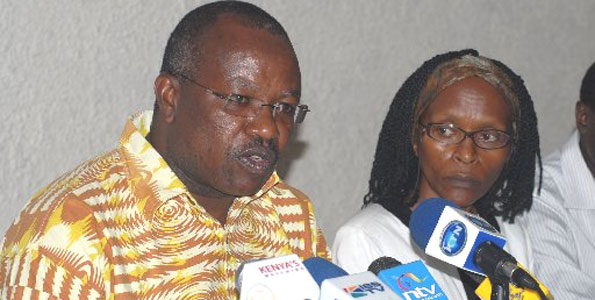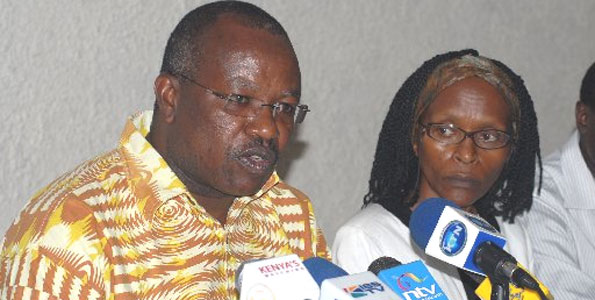The Registrar of Political Parties should be sacked for failing to rein in political parties’ indiscipline and malpractices, a lobby group has said.
Kenyans for Peace with Truth & Justice (KPTJ) on Sunday said the Registrar, Ms Lucy Ndung’u, has displayed an unwillingness to enforce her mandate and powers conferred upon her office by the Political Parties Act to rein in rogue political actors.
“She has wilfully failed to exercise her mandate in reining in political parties, a dereliction and abdication of duty which should constitute grounds for her removal,” KPTJ’s Gladwell Otieno told a news conference at the Hilton.
Accompanied by other lobbyists, they said political parties fraudulently registered members of the public as their affiliates, with no action being taken against them by Ms Ndung’u.
Other parties also submitted lists to the electoral agency that included unsolicited nominations to members of the public who only learnt of the actions through the media.
“The institution charged with the regulation of political affairs has displayed a disturbing reluctance to enforce their respective mandates with regard to regulating political competition and ensuring adherence to electoral laws,” Ms Otieno said.
“Of particular concern is the continued disregard of parameters and principles set out in the Constitution and other relevant legislation through practices such as party hopping, the use of violence and intimidation as an electioneering tactic; lack of internal party democracy, including favouritism and nepotism in disregard of the Political Parties Act.”
She hinted that the civil society may sue the Registrar for her inaction.
“We are determined to use all means within the law, including moving to the courts, to protect the public interest in credible, free and fair elections.”
The activists further said the Independent Electoral and Boundaries Commission (IEBC) displayed, within the last week, a tendency to buckle under to political pressure by repeatedly shifting timelines relating to the submission of nomination lists at the whim of the stronger political parties.
Although the Elections Act requires that nominations be conducted 45 days to the elections, the IEBC extended the timeline for political parties to submit their party lists two days after the lapse of the set deadline.
“IEBC must remember that we are watching it closely and that it will be held accountable if it bungles the March 2013 elections. Commissioners should know that they will be held individually liable for any failure of the elections,” Ms Otieno added.
They asked the IEBC to reject aspirants who submitted their nomination papers after the deadline, and that it does not accept nomination certificates from defectors who changed parties after the deadline.
The lobby has also recommended deregistration of political parties which have engaged in violence and fraudulent practices during the recent nominations.
“We are concerned that many of the aspirants cleared by political parties do not meet the threshold of leadership and integrity as set out in Chapter Six of the Constitution.
They further pointed out that although the IEBC is required to regulate and monitor the process by which political parties nominate their candidates, the commission only monitored the process and did not regulate their candidates.
“It was left to the political parties to regulate themselves with disastrous consequences.
This brings about the concerns around the independence of the IEBC – which were already raised in connection with the intervention by the Executive in procurement of biometric voter registration equipment, they said.
The postponement in the procurement of the equipment triggered a series of delays as voter registration that also led to political parties conducting nominations without a voter register to guide them as the provisional register had not been gazetted.
The list is currently undergoing inspection and verification. Voter education is expected to commence immediately.

